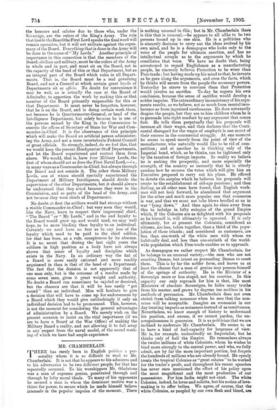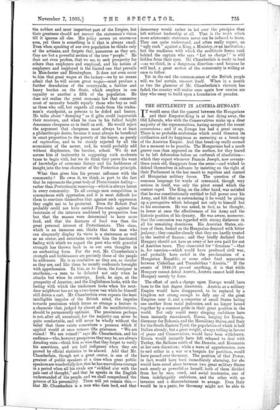MR. CHAMBERLAIN.
rrHERE has rarely been in English politics a per- sonality whom it is so difficult to read as Mr. Chamberlain. It is not that he appears to his admirers and to his adversaries to be two different people, for that has repeatedly occurred. To his worshippers Mr. Gladstone was a man of supreme genius, penetrated through and through by lofty moral ideals. To many of his opponents he seemed a man in whom the dominant motive was a thirst for power, to secure which he made himself believe intensely in the popular impulse of the moment., There is nothing unusual in this ; but iii Mr. Chamberlain there is this that is unusual,—he appears to all alike to be two persons bound up in one skin. He is a politician who is sincerely desirous to carry out the ideas evolved by his own mind, and he is a demagogue who looks only to the voice of the people for ultimate sanction, and has no intellectual scruple as to the arguments by which he conciliates that voice. We have no doubt that, being accustomed to regard Englishmen as a manufacturing people, he sincerely believes Protection to be wiser than Free-trade ; but having made up his mind to that, he invents as he goes along the arguments, and even the facts, which he thinks will secure from the people the necessary powers. Yesterday he strove to convince them that Protection would involve no sacrifice. To-day he regrets his own conclusion, because the sense of sacrifice would develop a nobler impulse. The extraordinary inconsistency of his argil- ments results, as we believe, not so much from mental inco- herence as from ingrained carelessness. He does not exactly despise the people, but they are to him children whom he is to persuade into right conduct by any argument that comes first. He tells them perpetually that his proposals will increase all their wages, and then declares that the Conti- nental disregard for the wages of employs is one secret of their success in the commercial struggle. At one moment he seems to speak merely from the point of view of the manufacturer, who naturally would like to be rid of com- petition; and at another he is thinking only of the Imperial bond, which, as he thinks, can beptightened only by the taxation of foreign imports. In reality we believe he is seeking the prosperity, and more especially the strength, of the country so earnestly that he is utterly careless how he secures the votes which will give him an Executive prepared to carry out his plans. He offered to devote the surplus which he believes his proposals will create to the establishment of old-age pensions ; and then finding, as all other men have found, that English work- men will not look forward, he abandoned that argument for the other and much more popular one that commerce is war, and that we must not take blows levelled at us in war "lying down." And then again he shies away from this to indulge in lofty eulogies of the grand Empire which, if the Colonies are as delighted with his proposals as he himself is, will ultimately be upreared. It is only ultimately, for at present the Colonists, considered as citizens, are less, taken together, than a third of the popu- lation of these islands ; and considered as customers, are less than one-tenth of the white men with whom we habitually deal, and less than one-sixtieth of the world- wide population which Free-trade enables us to approach.
As demagogue we rather respect Mr. Chamberlain, for he belongs to an unusual variety,—the men who are not courting Demos, but intent on persuading Demos to court them. This is by far the nobler form, and leaves us at least the chance that a man of genius may possess himself of the springs of authority. He is the Minister of a Sovereign more or less stupid, not his courtier. In this capacity our only reproach for him is that, like most Ministers of absolute Sovereigns, he hides many truths from his master, and grows by degrees too reckless in his methods of persuasion. Mr. Chamberlain does not even shrink from talking nonsense when he sees that the non- sense will be acceptable. Imagine an economist in our day treating imports as nuisances instead of as remittances. Nevertheless, we know enough of history to understand his position, and excuse, if we cannot pardon, the un- scrupulousness it generates. It is as politician that we are inclined to underrate Mr. Chamberlain. He seems to us to have a kind of half-capacity for largeness of view. He is, for example, undoubtedly an Imperialist, but he thinks only of half the Empire. He remembers always the twelve millions of white Colonists, whom he wishes to bind more strongly to the central power, and who, we fully admit, are by far the more important portion, but forgets the hundreds of millions who are already bound. He openly treats the tropical Colonies as "great estates "to be worked for the trader's profit, and throughout his recent speeches has never once mentioned the effect of his policy upon the most magnificent and the most productive of our possessions. For him India might not exist. The white Colonies, indeed, he loves and solicits, but his notion of love- making is to offer bribes. We agree, of course, that the white Colonies, as peopled by our own flesh and blood, are the noblest and most important part of the Empire, but their greatness should not narrow the statesman's vision till it ignores all else. His policy covers an enormous ' area, yet there is something in it that is always small. Even when speaking of our own population he thinks only of the artisans, and forgets that, numerous as they are, they are but a powerful section of the true "people." He does not even profess, that we see, to seek prosperity for others than employers and employed, and his notion of employers and employed is the limited one that prevails in Manchester and Birmingham. It does not even occur to him that great wages at the factory—we by no means admit that he will secure great wages—must produce a further denudation of the countryside, a further and heavy burden on the State, which employs in one capacity or another a fifth of the population. He does not realise the great economic law that commerce must of necessity benefit equally those who buy as well as those who sell, but regards all rivals from the trades- man's standpoint, as persons to be defied and. beaten. He talks about " dumping " as if gifts could impoverish their receivers, and when he rises to his fullest height denounces cheapness as in itself an evil. He would reject the argument that cheapness must always be at least a philanthropic desire, because it must always be beneficial in exact proportion to the poverty of the buyer, as purely ad captandum, and to be sternly rejected by all the economists of the newer, and, he would probably add without displeasure, the harsher, school. We do not accuse him, of insincerity in suggesting such moderate taxes to begin with, but we do think they prove his want of knowledge of economic history and his feebleness of insight, into the true character of the Protection principle.
What then gives him his present influence with the community ? He owes it, we think, in part to the fact that he represents the great body of Protectionist feeling— rather than Protectionist reasoning—which is always latent in every community. To all average men competition is synonymous with oppression, and it is most difficult for them to convince themselves that against such oppression they ought not to be protected. Even Sir Robert Peel probably could not have carried Free-trade against the resistance of the interests maddened by prospective loss but that the masses were determined to have more food, and that the dearness of food was then the great personal interest of Protectionists. This class, which is an immense one, thinks that the man who can eloquently display its views is a statesman as well as an orator, and entertains towards him the fascinated. feeling with which we regard the poet who with graceful strength has thrown back to us our own thoughts in an enchanting form. For the rest, Mr. Chamberlain's strength and feebleuesses are precisely those of the people he addresses. He is as combative as they are, as insular as they are, and like them he usually confounds foresight with apprehension. To him, as to them, the foreigner is anathema,—a man to be defeated not only when he attacks but when he outstrips. Look, he says, at the prosperity of America; and the Englishman looks, with the feeling with which the tradesman looks when his next- door neighbour has set up a two-horse van while he himself still drives a cart. Mr. Chamberlain even repeats the least intelligible impulse of the British mind, the impulse towards pessimism which forms so strange a feature in a character that, judged by almost all its manifestations, should be permanently optimist. The pessimism perhaps is not, after all, unnatural, for the majority can never be quite comfortable, and will never be wholly without the belief that there exists somewhere a panacea which if applied would at once remove tDis grievance. "We are ruined ! We are ruined ! " says Mr. Chamberlain, and his audience—who, however prosperous they may be, are always dreading ruin—think him so wise that they forget to verify his assertions, and, are half indignant When they are proved by official statistics to be absurd. Add that Mr. Chamberlain, though not a greatorator, is one of the greatest of public speakers at a time when great public speakers are wonderfully few, that he has marvellous courage iU a period when all his rivals are " sickbed o'er with the pale cast of thought," and that he speaks in the English understanded of the people, and we shall comprehend the potence of his personality. There, will yet remain this,— that Mr. Chamberlain is a man who dare lead, and that democracy would rather be led over, the precipice than left without leadership at all. That is the truth which more aristocratic statesmen never can be induced to learn. They can quite understand, and often really expect, an "ugly rush" against a King, a Ministry, or an institution ; but the readiness with which the multitude forms rank behind the captain who says "Let us charge ! " is still hidden from their eyes. Mr. Chamberlain is ready to lead —as we think, in a dangerous direction—and because he will lead, a great section of the community is willing at once to follow.
Yet in the end the common-sense of the British people will, we feel certain, reassert itself. When in a month or two the glamour of Mr. Chamberlain's rhetoric has faded, the country will realise once again how unwise are they who essay to build upon a foundation of paradox.































































 Previous page
Previous page